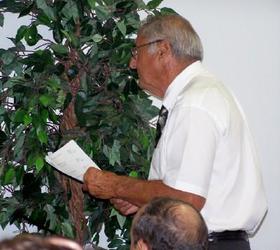
No set fee schedule, a downward spiraling real estate market and other factors are reasons the Maricopa Unified School District’s governing board has had a difficult time agreeing on voluntary rooftop fees for developers.
A voluntary rooftop fee is a sum issued to the district via a developer. This fee is not required by law but, in almost every case, is provided to the schools as a way of offsetting the cost new communities will place on the district.
Fees are broken down into a per rooftop amount and often will include a land donation.
However, determining fair fee rates and a reasonable timetable for payment of those fees has been more difficult than pulling a lion’s teeth.
Since the district started collecting these fees the amount donated per roof top has typically been in the $150 range; however, there are some exceptions.
Currently there are several housing developments in different stages of development in the Maricopa area that are in the process of attempting to negotiate these voluntary fees with the board.
These developments are Eagle Shadow, Desert Gardens and Cactus Springs.
All three of these developments have done multiple presentations in front of the Maricopa Unified School District Governing Board, and all three of them have yet to walk away with a deal. Representatives from the Eagle Shadow Development gave the most recent presentation.
Eagle Shadow is a home development located at the intersections of the Maricopa/Casa Grande Highway and Farrell Road. The placement of the subdivision puts a portion of it in Maricopa and another portion in Casa Grande. The Maricopa portion of the development includes 4,928 planned homes.
The developer worked out an agreement with the Casa Grande Elementary School District nearly a year ago for $400 per lot and one 12-acre site donation.
However, in the two years it has been negotiating with MUSD, Eagle Shadows has been unable to strike a deal. “This is getting a bit frustrating, but we want to work out a deal that is fair for all,” said Jim Kenny, president El Dorado Holdings, Inc.
The latest deal proposed by Eagle Shadows would have donated $300 per roof top to the district, with half payable upon final plat and the other half due 30 days after the issuance of final building permit.
In addition to this monetary donation, the builder agreed to donate 36 acres of land to the district either to be divided into one 12-acre site and one 24-acre site or three 12-acre sites. “With the value of the land donation factored in, we are basically giving a donation of $1,400 a home,” Kenny said.
Referring to the split cash donation, school board member Tim White said he would be in favor of the offer if the district were to get all of the money at final plat. “Why should we have to wait for the money to trickle in?” White asked.
Kennny said that the contract could be arranged so that all money was paid at issuance of final plat, but, since there are four phases in the project, the district would receive four checks.
White countered by saying that was unacceptable because of the way the market is now. “Who knows when these homes will start to be built? It could be three, four or even five years before the district begins to see this money, and by then that $300 may not be worth much,” White said.
White suggested that a scale that takes into account inflation may be needed to make the $300 number work.
Another issue raised about the proposed donation focused around the parcels of land.
The district has accepted parcels of land in the past with the intention of building one project or another only to find out that they were unable to do so or that the land had drainage issues that the district had to pay out of pocket to fix.
Paul Kasparian, facilities and development manager for MUSD, said,” We need to look more closely at these land sites; we have been burned before in the past.”
Kenny countered and said the developer would be willing to work into the language of the agreement that they were responsible for engineering the land.
During the debate, board member Tracy Davis brought to light a prior agreement the board had drafted but never submitted to the developer.
This agreement called for a donation of $1,000 per rooftop for the first 4,500 units and $4,000 per unit for the remaining homes. The total value of that agreement was $4.928 million, but it was never submitted to the developer. Davis suggested that the developer uses that template when drafting a new deal.
However, Kenny said that deal was put together nearly two years ago when the market was in a different state. That agreement didn’t involve the donation of land and was structured in 2005. It also contained language that stated if other developers were paying less the fees would be decreased accordingly.
By the end of the debate Kenny had agreed to meet with members of the district to look at the parcels of land and draft a new agreement.
Desert Gardens and Cactus Springs developments proposed development impact fees to the board almost a month ago. This proposal would pay the district $1,250 per roof top with payment due at the issuance of building permit. Between the two developments there will be a total of 1,686 homes.
“We have researched other developments across the state and feel that our numbers are in line with what other districts are receiving, said Kelly Gorrie, a representative for both communities. The fees that Gorrie found ranged from $850 to $1,500 a rooftop.
School board member Jim Chaston thought this proposed fee was too little. “We used to require a $4,000 donation without a land donation, but I realize the market has changed, and that number needs to come down.” Chaston added that the $1,250 number was not acceptable.
White said that $2,000 would be a workable number.
Gorrie countered by saying she would take the information back to her superiors and return with a revised offer at a later date.
File photo

![Who’s the Best Mom InMaricopa? Nominate now! Marlene Marshall, Christina Olivares, and Meghan Bremer. [Bryan Mordt]](https://www.inmaricopa.com/wp-content/uploads/2023/05/BCM_8465-218x150.jpg)



![Maricopa sheds tears amid Maui wildfires that killed dozens For Maricopa resident Janelle Gomez, the sorrow mirrors the loss of a family member. [Brian Petersheim]](https://www.inmaricopa.com/wp-content/uploads/2023/08/Gomez-218x150.jpg)
![Embracing Freedom: Celebrating the Fourth of July Councilmember Vincent Manfredi at Great American 4th 2021 [Victor Moreno]](https://www.inmaricopa.com/wp-content/uploads/2023/07/2021-Great-American-4th-e1688414543522-218x150.jpg)





![Alleged car thief released without charges Phoenix police stop a stolen vehicle on April 20, 2024. [Facebook]](https://www.inmaricopa.com/wp-content/uploads/2024/04/IMG_5040-218x150.jpg)

![MHS G.O.A.T. a ‘rookie sleeper’ in NFL draft Arizona Wildcats wide receiver Jacob Cowing speaks to the press after a practice Aug. 11, 2023. [Bryan Mordt]](https://www.inmaricopa.com/wp-content/uploads/2024/04/cowing-overlay-3-100x70.png)


